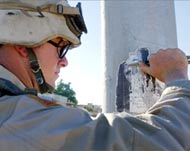New tactics for US choppers
The US military is taking steps to reduce the risk of its helicopters being targeted by Iraqi guerrillas.

Defence officials in Washington said on Friday that chopper pilots have begun changing flight patterns and using other evasive tactics to try to avoid being shot down by missiles and other weapons fired by guerrillas.
The changes follow two deadly helicopter crashes in Iraq in less than a week.
On Friday at least six American soldiers were killed after a Black Hawk helicopter was “forced down” near the northern Iraqi town of Tikrit, the US Army said.
The craft went down on a riverbank about 1km (half a mile) from the US base in Saddam Hussein’s former palace near Tikrit, which is Saddam’s hometown and a hotbed of anti-US sentiment.
The cause of the crash has not yet been confirmed but US soldiers said it had been probably shot down with a rocket-propelled grenade.
If confirmed to have been destroyed by hostile fire, it would be the third US helicopter brought down by guerrillas in two weeks.
All those killed were from the 101st Airborne Division based in Tikrit, confirmed spokeswoman Major Jossyln Aberle.
“Six soldiers were on board and all of them were killed,” said Aberle. “At this stage we don’t know if it was due to mechanical failure or another reason,” she said.
At the weekend, guerrillas shot down a US Chinook west of Baghdad, killing 16 soldiers in the biggest single strike on US-led forces since they invaded to oust Saddam Hussein.
The third chopper, a Black Hawk, was shot down near Tikrit on 25 October, injuring the pilot.
US convoy ambushed
Also on Friday, fighters with guns and rocket-propelled grenades attacked a US convoy in the northern Iraqi city of Mosul, killing an American soldier and wounding six others.
 |
|
A US soldier scratches at an anti- |
The attack brought to at least 140 the number of US soldiers killed in action in Iraq since US President George Bush declared major combat over on 1 May.
In a separate attack, a roadside bomb planted near a hotel in the city wounded three US soldiers, Sergeant Kelly Tyler of the 101st Airborne Division told Reuters.
Mosul has seen less guerrilla activity than Baghdad in recent months, but there has been a surge of attacks in the ethnically diverse northern city over the past few days.
Elsewhere on Friday, an Iraqi woman was killed and her husband wounded when a mortar bomb struck their house in Moqdadiya, 100km (60 miles) northeast of Baghdad, the wounded man said Friday.
Yunis Ibrahim Hatim, 39, said it was one of four bombs which apparently targeted an adjacent police station, where there are also US troops. The other three fell in an empty field near his home, he said.
Also on Friday morning in Baghdad, resistance fighters fired a rocket-propelled grenade at a US tank and a civilian vehicle with American soldiers inside, wounding one soldier and an Iraqi boy.
On Thursday morning, a U.S. soldier was killed and two wounded in a bomb attack on their convoy on a highway east of Mosul, the U.S. military said on Friday.
It said the soldiers, from the 101st Airborne Division, were
in a five-vehicle convoy when the bomb was detonated
Covert force
In an attempt to silence critics who point out that a central aim of the US campaigns in Afghanistan and Iraq remain unfulfilled, the US military have created a covert commando force to hunt down deposed Iraqi leader Saddam Hussein, al-Qaida chief Usama bin Ladin and Taliban leaders.
Known as Task Force 121, the commando is designed to react more quickly to intelligence tips about “high-value targets” and will not be restricted within the borders of Iraq and Afghanistan, Pentagon and military officials told The New York Times.
The covert force, the sources said, came into being after commanders realised they needed to streamline operations and that the hunt for al-Qaida, Taliban and ex-Iraqi regime members should not be restricted by international borders.
The sources, however, did not disclose whether the covert force requires the permission of a foreign government to operate in its territory.